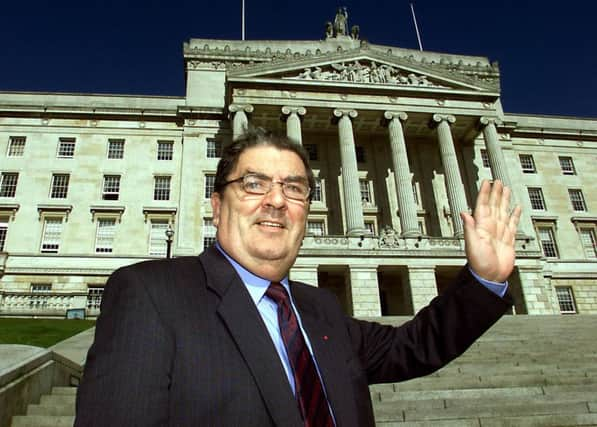UK leaders could learn from John Hume when dealing with Brexit, says director


John Hume, the former SDLP leader and winner of the Nobel Peace Prize, was one of the dominant figures in late 20th century Ulster and won respect from both sides of a bitter political divide for his commitment to democracy and bringing an end to violence.
A documentary exploring the politician’s career and legacy will be screened at the Scottish Parliament on Friday, October 11, as part of the annual Festival of Politics at Holyrood.
Advertisement
Hide AdThe film’s director, Maurice Fitzpatrick, told The Scotsman that Hume - who is now retired from politics - realised early on how the European Union could play a crucial role in securing peace in Northern Ireland.
“Hume was always at the centre of the debate, asserting the need for a constitutional, and an inclusive, approach to what was essentially a political problem,” he said.
“He always advocated political means. He always had his eye on the various strands of the problem faced by the people in Northern Ireland - whether it was their identification with the politics and culture of the United Kingdom, or with the politics and culture of Ireland.
“And in the backdrop of all that was the existence of the European Union, which saw a pooling of sovereignty on a consensual basis - which Hume was a major advocate of.”
The documentary, In the name of peace: John Hume in America, features interviews with Bono, President Bill Clinton and Sir John Major.
After the screening, which begins at 4.45pm, there will be a question and answer session with Fitzpatrick, led by journalist David Clegg.
Advertisement
Hide Ad“I would hope that within the film, people can see how political problems can be addressed in a contemporary environment,” Fitzpatrick continued.
“The most salient aspect of Hume’s political life was the seriousness with which he undertook his work. He was utterly dedicated and concentrated in his approach. He understood he had to relate these concepts to people of all stripes and descriptions.”
Advertisement
Hide AdAsked what positives could be taken from the film in the current political climate, the director added: “When confronted with utter misery and devastation, with the near impossibility of doing politics, when all of these things occurred during the Troubles, John Hume hammered home the message: we need to sit around the table and thrash out a deal - a programme of government that will work and be accepted by the majority.
“People from different parties, and with different outlooks, did go there in the end.
“Hume’s unique ability to marshall support from the highest levels in Washington, and to bring together the central strands of political settlement in 1998, is truly inspiring.
“At a time when we are in a state of advanced political failure - Belfast springs to mind, but also London - there is a great lesson to be gleaned from Hume’s perseverance and his integrity, and the nobility he brought to politics.”
